Is the Labor Market in Its Entrepreneurship Era?
Young workers are skipping the never-ending job hunt and starting their own businesses

With hiring rates and labor demand reaching new lows, entrepreneurship is on the rise. The share of job-switchers moving into entrepreneurship has reached a seven-year high, almost doubling the post-pandemic low.
The average age of entrepreneurs has fallen sharply, and high-school graduates show the biggest increase in entrepreneurship rates. Not only job switchers, also new labor market entrants are increasingly choosing entrepreneurship as their first step into the labor market.
Tech stands out as the top landing industry, attracting the largest share of straight-from-school entrepreneurs thanks to low capital barriers and strong skill transferability.
The US labor market has undergone remarkable sectoral and behavioral shifts since 2020. One quiet but powerful trend is that Americans are increasingly deciding to build their own ventures. While headlines tend to focus on layoffs or AI disruption, our labor market microdata shows that for many workers, especially younger ones, entrepreneurship is no longer a late-career pivot but a serious early-career option.
The combination of tight labor markets, easier digital tools, growing cultural appeal around independence, and falling real wages in many early-career jobs are likely motivating today’s entrepreneurs. The share of job switchers who become entrepreneurs climbed steadily throughout 2023–2025. After bottoming out around 0.44% in early 2022, the rate nearly doubled to 0.85% by early 2025. Our data points to a clear inverse relationship: Entrepreneurship has become an increasingly common landing spot for job switchers as the labor market softens including the recent cooldown. When employers pull back on hiring, workers appear to compensate by creating their own opportunities. The broader “creator economy,” combined with remote work and flexible contracting norms, may also be normalizing nontraditional career paths.

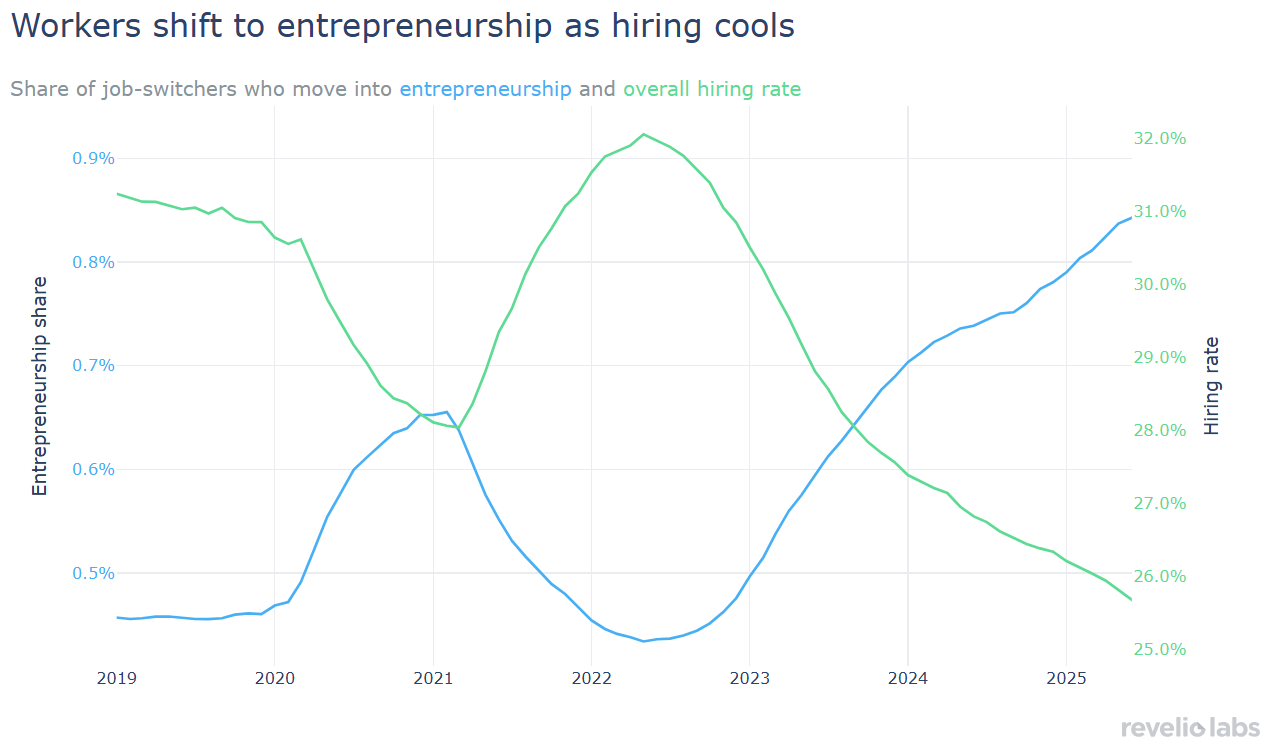
Not all education groups respond to the cooling job market in the same way: Entrepreneurship is rising most sharply among workers without college degrees. Relative to 2023, high school graduates saw the biggest increase, a 0.18-percentage-point rise in entrepreneurship, whereas graduate, associate and bachelor’s degree holders experienced more modest changes. The strong rise in entrepreneurship rates among high school graduates may suggest that workers with fewer formal credentials, who often face the steepest declines in traditional hiring channels, are the most likely to pivot toward self-employment as an alternative path. Meanwhile, the rise among graduate-degree holders may reflect a different force: tech-adjacent professionals launching independent practices or startups as AI alters professional workflows.

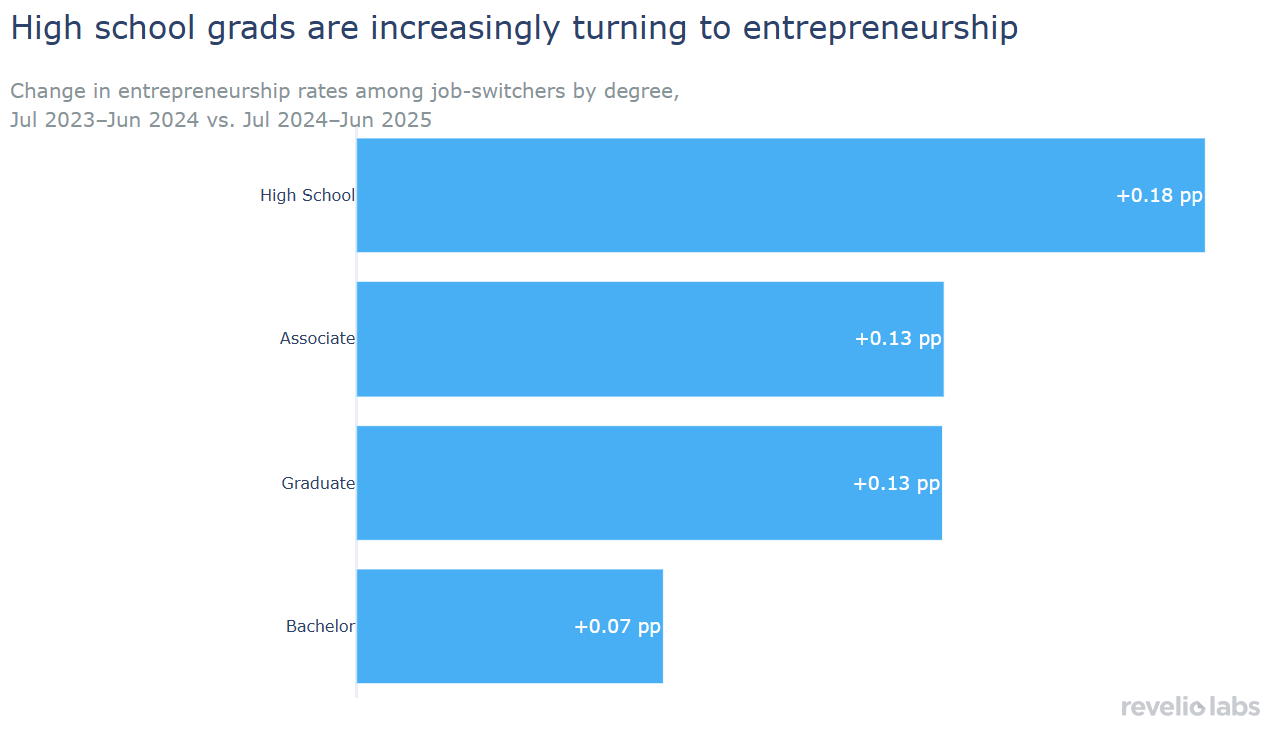
Supporting the trends in education, the mean age of workers shifting into entrepreneurship is also dropping markedly, reaching lows not seen in several years. Today’s entrepreneurs are on average younger than 34 years old when they start their venture. This downward trend suggests that entrepreneurship is no longer primarily a mid-career pivot but increasingly an early-career choice. Rather than waiting for stable full-time roles, younger workers are launching ventures earlier, turning uncertainty into a form of accelerated risk-taking.

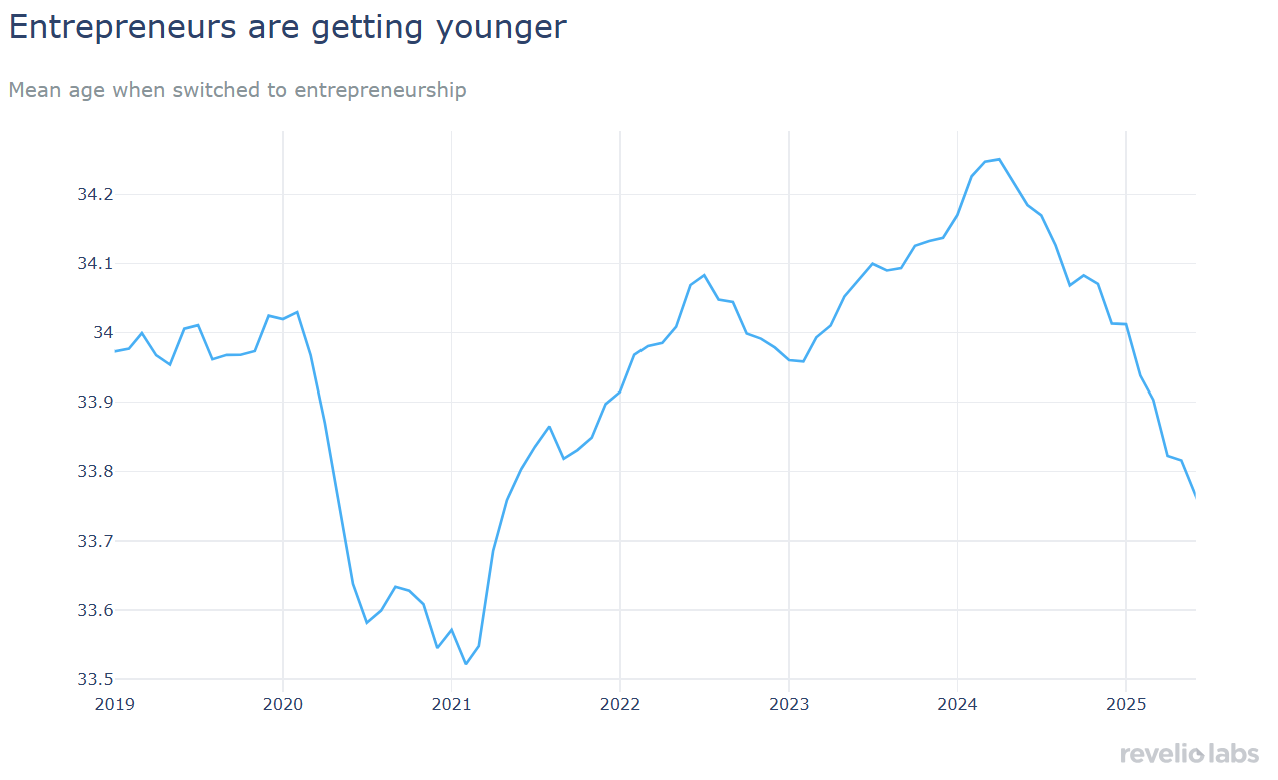
How do these young, possibly new entrants compare to the broader workforce when it comes to entrepreneurship? They swing hardest when the market turns. The 2020 pandemic shock and the 2022–23 white-collar slowdown both produced substantial increases in entrepreneurship among first-job workers, while the ongoing cooling of 2024–25 has generated another sharp uptick with new entrants shifting to entrepreneurship at much faster pace than the rest of the workforce. These periods of uncertainty appear to make entrepreneurship a more attractive or maybe even a necessary path for people stepping into the workforce for the first time. One can also say that the lack of outside options in a cooler labor market lowers the opportunity cost of entrepreneurship. In contrast, incumbent workers exhibit only a slow, gradual increase in entrepreneurial transitions, suggesting they tend to pursue entrepreneurship more cautiously and less cyclically. While the new-entrant curve is below that for more seasoned workers for now, the upward trend is likely to accelerate again as students brace for a tougher job search.

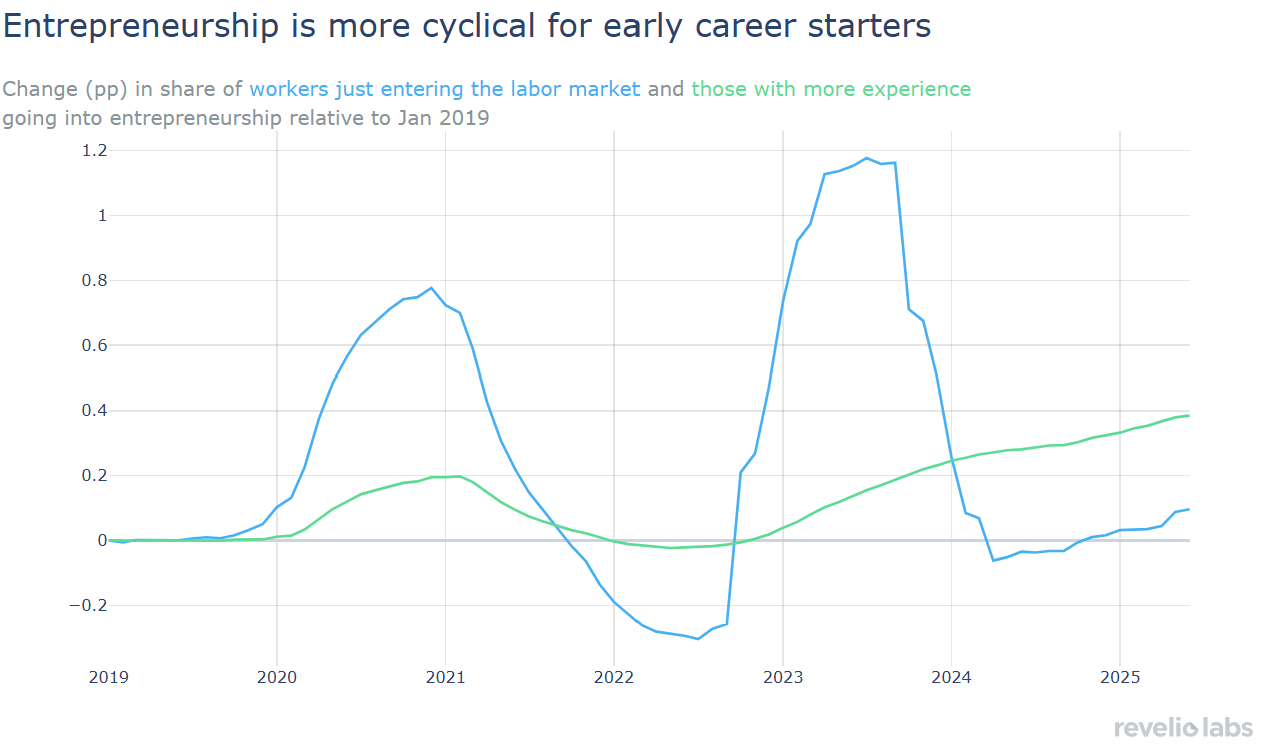
Despite the common assumption that early ventures are short-lived, our data shows surprising durability among first-job entrepreneurs. More than two-thirds remain with their venture for over three years, and fewer than 7% exit within the first year. This persistence suggests that early-career entrepreneurship is not simply a stopgap, it’s a sustained career strategy. Whether these ventures remain small, evolve over time, or expand into formal businesses, the commitment level is high, underscoring that young entrepreneurs are not merely reacting to the market but actively building long-term pathways.

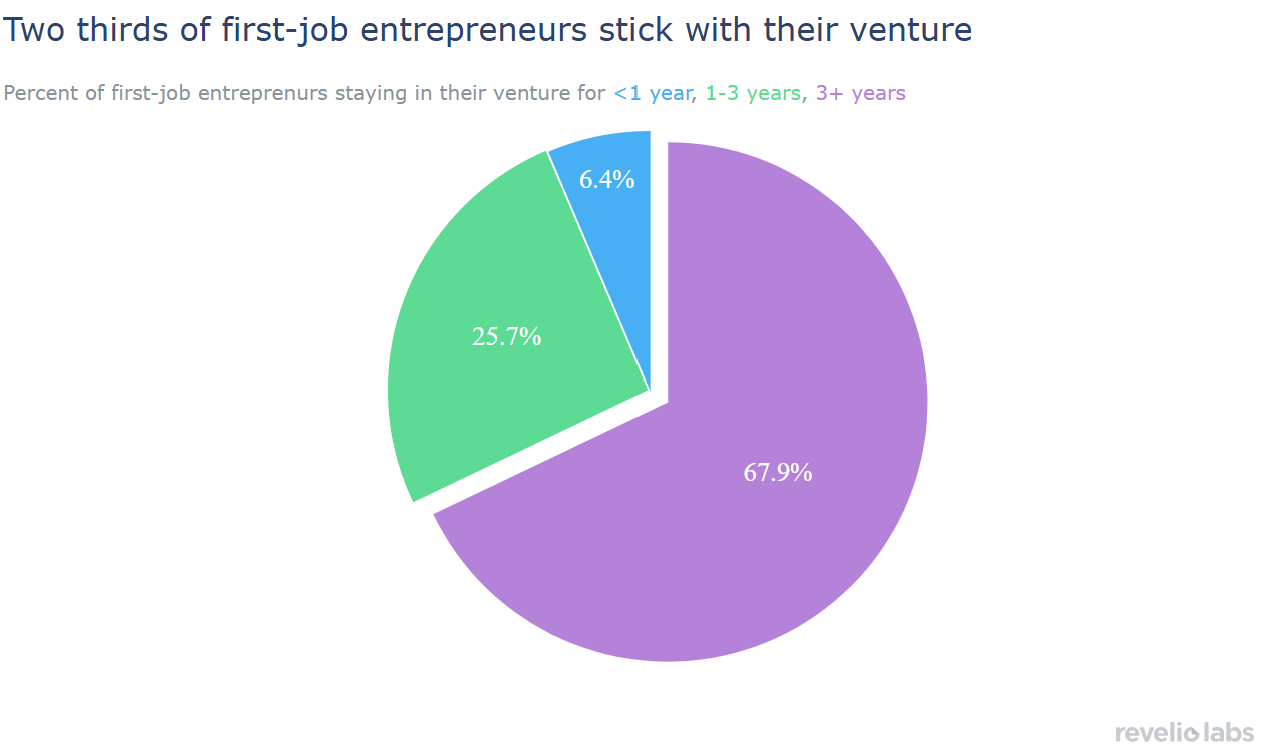
Finally, when we look specifically at first-job entrepreneurs, one industry stands out: tech, which alone captures 18.2% of all first-job founders. The field attracts early entrepreneurs because the skills are transferable, the startup costs are low, and freelance or project-based work is easy to find. The rapid spread of AI tools has also made it cheaper and faster to build software-driven businesses, while communities like coding bootcamps, fintech groups, and startup accelerators give new founders early support. Beyond tech, we also see notable concentrations in marketing. public-sector management, digital commerce, HR services, and finance.

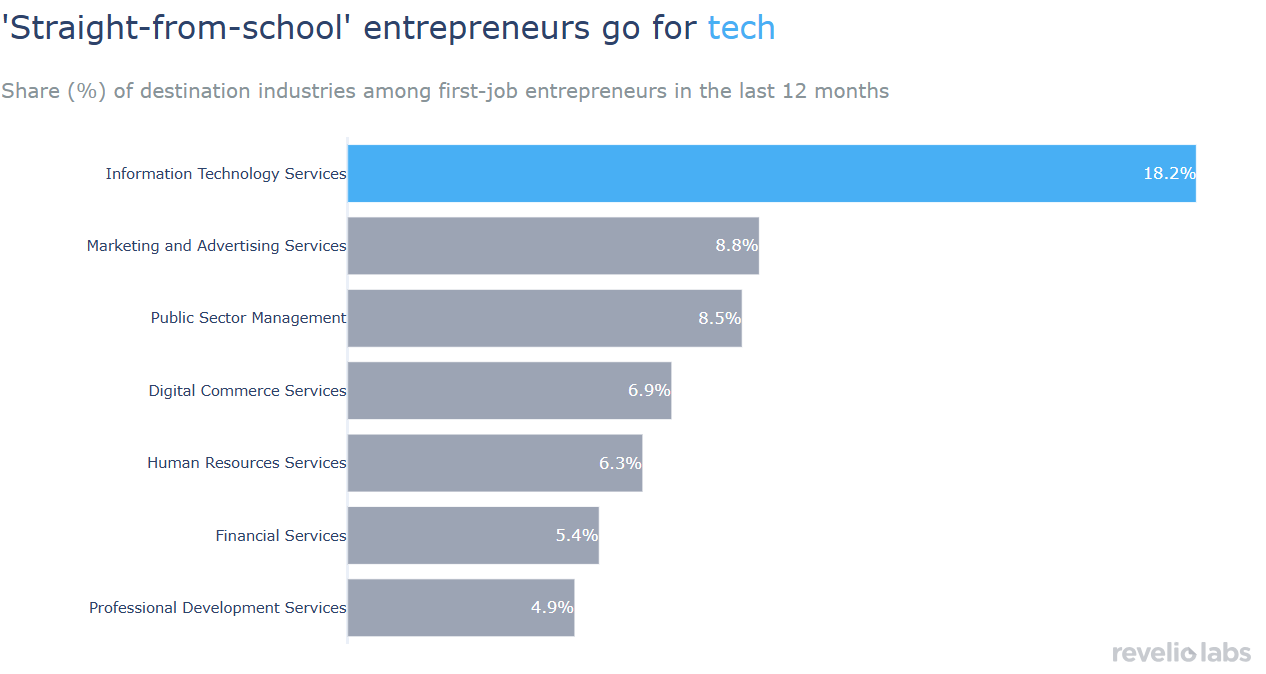
The rise in entrepreneurship, especially among young workers, suggests a structural shift in how Americans value autonomy relative to traditional employment ladders. In today’s cooling labor market, where early-career hiring is softer and opportunities feel less certain, the appeal of building something independently is even stronger. Employers expecting stable long-run attachments may increasingly find themselves competing with entrepreneurial alternatives, not just other companies. Today’s jobs must offer not just stability but meaning, growth, and flexibility if they are to compete with the appeal of independence. The rise of the “first-job founder” may be one of the clearest indicators that the next decade of labor-market change will be shaped not just by technology, but by worker agency.


